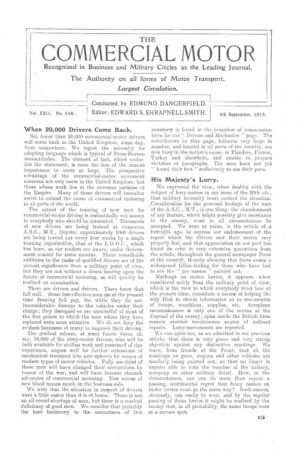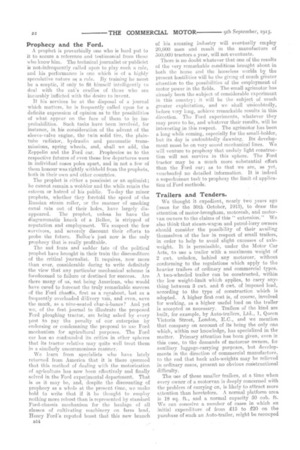COMMERCIAL MOTOR
Page 1

Page 2

If you've noticed an error in this article please click here to report it so we can fix it.
Recognized in Business and Military Circles as the Leading Journal.
The Authority on all forms of Motor Transport. Largest Circulation.
Conducted by EDMUND DANGERFIELD.
Editor: EDWARD S. SHRAPNELL-SMITH.
When 20,000 Drivers Come Back;
Not fewer than 20,000 commercial-motor drivers will come back to the United Kingdom, some day, from somewhere. We regret the necessity for adopting language which is typical of Press-Bureau inexactitudes. The element of fact, which underlies the statement, is none the less of the utmost importance to users at large. The prospective advantage of the commercial-motor movement concerns not only users in the United Kingdom, but those whose work lies in the overseas portions of the Empire. Many of these drivers will hereafter assist to extend the cause of commercial motoring in all parts of the world.
. The extent of the training of new men for commercial-motor driving is undoubtedly not known to everybody who should be interested. Thousands of new drivers are being trained at numerous A.S.C., M.T., Depots; approximately 1000 drivers are being turned out every four weeks by a single training organization, that of the L.G.O.C., which has been, as our readers are aware, under Government control for some months. These remarkable additions to the ranks ofqualified drivers are of the utmost significance from a military point of 'dew, hut they are not without a direct bearing upon the future of commercial motoring, as will quickly be realized on examination.
There are drivers and drivers. Users know that full well. Some less-effective men am at the present time drawing full pay, the while. they do notinconsiderable damage to the vehicles under their charge; they disregard .or are unmindful of Most of the fine points to which the men whom they have replaced. were most attentive. We de, not deny the evident keenness of many to improve their driving.
The gradual release, at some future dates, of, say, 18,000 of the army-motor drivers, who will ho both available for civilian work and possessed of ripe experience, augurs well for further extensions of mechanical transport into new spheres by means of modern types of motor vehicles. Fully one-third of these men will have changed their occupations by reason of the war, and will have become staunch advocates of commercial motoring. This access of new blood means much on the business side.
We wish that the situation in respect of drivers were a 'little easier than it is at home. There is not an all-round shortage of men, but there is a marked deficiency of good men. We consider that probably the best testimony to the correctness of this summary is found in the cessation of communications for our " Drivers and Mechanics •" page. The contributors to that page, hitherto very large in number, and located in all parts of the country, are now busy in the nation's cause, in Flanders, France, Turkey and elsewhere, and unable to prepare sketches or paragraphs. The men have not yet " found their feet " sufficiently to use their pens.
His Majesty's Lorry.
We expressed the view, when dealing with the Subject of lorry-names in our issue of the 26th ult., that military necessity must control the situation. ,Consideration for the personal feelings of the men of the A.S.C., M.T., is one thing: the abandonment of any feature, which might possibly give assistance to the enemy, must in all circumstances be accepted. We Were at pains, in the article of a fortnight ago, to express our endorsement of the regret which the drivers and their, mates very properly feel, sand that appreciation on our part has found its echo in, very extensive quotations from the article, throughout the general newspaper Press of the countit, thereby showing that there exists a widespread fellow-feeling for these who have had to see the " pet names " painted out.
Marking-8 on motor lorries, it appears, when considered solely from the military point of view, which is the view to which everybody must bow at the present tinae, constitute a means of helping the wily Hun to obtain information as to movements of troops, munitions, supplies, etc. Aeroplane reconnaissance is only one of the means at the disposal of the enemy; spies inside the British lines remain anoth6r. troublesome source of indirect reports. Lorry-movements are reported.
We can quite see, as we admitted in our previous article, that there is very grave and very strong objection against any distinctive markings. We learn, from friends at the Front, that all the markings on guns, wagons and other vehicles are similarly being painted out, so that no longer is anyone able to note the number of the battery, company or other military detail. How, in the circumstances, can one do more than repeat a passing, sentimental regret that fancy names on motor lorries must go the same way? Such names, obviously, can easily be seen, and by the regular passing of those lorries it might be realized by the enemy that, in. all probability, the same troops were at a certain spot.
Prophecy and the Ford.
A prophet is proverbially one who is hard put to it to secure a reference and testimonial from those who know him. The technical journalist or publicist is notiinfrequently called upon to play such a role; and his performance is one which is of a highly speculative nature as arule. By training he must be a sceptic, if only to fit himself intelligently to deal with the cat's cradles of those who are incurably inflicted with the desire to invent.
If his services be at the disposal of a journal which matters,he is frequently called upon for a definite expression of opinion as to the possibilities of what appear on the face of them to be improbabilities. Such tasks have been involve,d, for instance, in his consideration of the advent of the sleeve-valve engine, the twin solid tire, the plaintube radiator, hydraulic:, and pneumatic transmissions, spring wheels, and, shall we add, the Zeppelin and the Ford car. Prophecies as to the respective futures of even these few departures were in individual eases poles apart, and in not a few of them honour was rightly withheld from the prophets, both in their own and other countries.
The prophet is either a pessimist or an optimist; he cannot remain a wobbler and the while retain the esteem or hatred, of his public. To-day the minor prophets, whether they foretold the speed of 4he Russian steam . roller, or the manner of smoking canal rats out, of their holes, have largely disappeared. The prophet, unless lie have the diagrammatic knack of a 13elloc, is stripped of reputation and employment. We suspect the few survivors, and severely discount their efforts to probe the future. Belloc's just now is the only prophecy that is really profitable.
The sad feats and sadder fate of the political prophet have brought in their train the discomfiture of the criticaljournalist.. It requires, now more than ever, . considerable daring to write. definitely the view that any particular mechanical scheme is foredoomed to failure or destined for success. Are there many of tie-, not being American, who would have cared to forecast the truly remarkable success of the Ford chaOis, first as a runabout, last as a frequently overloaded (.11.ivery van, and even, save the mark, as a nine-seated char-à-bancs? And yet we, of the first, journal to illustrate the proposed Ford ploughing tractor, are being asked by every post to pay the penalty of our enterprise by endorsing or condemning the proposal to use Ford mechanism for agricultural purposes. The Ford car has so confounded its critics in other spheres that its tractor_ relative may quite well treat them in a similarly unceremonious manner.
We learn from specialists who have lately returned from America that it is there assumed that this method of dealing with the motorization of agriculture has now been effectively and finally solved in the Ford experimental department. That is as it may be, 'and, despite the discounting a prophecy as a whole at the, present time, we make hold to write that if it be thought to employ nothing more robust. than is represented by standard Ford-chassis mechanism for the haulage of all classes of cultivating machinery on farm land, Henry Ford's reputed boast that this new branch
B14 of his amazing industry will eventually employ 20,000 men and result in the manufacture of 500,000 tractors a year, will not eventuate.
There is no doubt whatever that one of the results of the very remarkable conditions brought about in both . the horseand the .horselees -worlds by the present hostilities will be the giving of much greater attention to the possibilities of the employment of motor power in the fields. The small agrimotor has already bee-n the subject of considerable experiment in this country; it will be the subject of much greater exploitation, and we shall undoubtedly, before very. long, achieve remarkable results in this direction. The Ford experiments, whatever they may prove to be, and whatever their results, will be interesting in this respect. The agrinaotor has been a long while coming, especially for the small-holder, but its day is undoubtedly dawning. its developmentmust be on very sound mechanical lines. We will venture to prophesy that unduly light construction will not survive in this sphere. 'The Ford tractor may be a much more substantial effort than the Ford car; a.s to that we are, as yet, vouchsafed no detailed information. It is indeed a superhuman task to prophesy the limit Of application of Ford methods.
Trailers and Tenders.
We thought it expedient, nearly two years ago (issue for the 30th October, 1913), to draw the attention of motor-brougham, motoreah, and motorvan owners to the claims of this " extension" We also think that steam-wagon and petrol-lorry owners should consider the possibility of their availing themselves of the law in respect of small trailers, in order to help to avoid slight excesses of axleweight. It is permissible, under the Motor Car Acts, to use a trailer with a maximum weight of 2 cwt. unladen, behind any motorcar, without conforming to the regulations which apply to the heavier trailers of ordinary and commercial types. A two-wheeled trailer can be constructed, within the low weight-limit which applies, to carry anything between 3 cwt. and 6 cwt. of imposed load, according to the type of construction which is adopted. A higher first cost is, of course, involved for working, as a higher useful load on the trailer is accepted as necessary. Trailers of the kind are built, for example, by Auto-trailers, Ltd., 1, Queen Victoria Street, London, E.C., and we mention that company on account of its being the only one which, within our knowledge, has specialized in the matter. Primary attention has been given, ..even in this case, to the demands of motorcar owners, for auxiliary luggage-carrying purposes, but developments in the direction of commercial manufacture, to the end that back axle-weights may be relieved in ordinary cases, present no obvious constructional difficulty. The use of these smaller trailers, at a time when every owner of a motorvan is deeply concerned with the problem of carrying on, is likely to attract more attention than heretofore. A normal platform area is 18 sq. ft., and a normal capacity 50 cub. ft. We can conceive a number of cases in which an initial expenditure of from £15 to no on the purchase of such an Auto-trailer, might be recouped






















